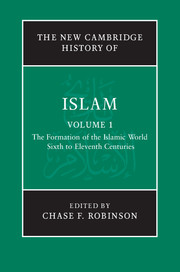Book contents
- Frontmatter
- Introduction
- PART I THE LATE ANTIQUE CONTEXT
- PART II UNIVERSALISM AND IMPERIALISM
- 5 The rise of Islam, 600–705
- 6 The empire in Syria, 705–763
- 7 The empire in Iraq, 763–861
- 8 The waning of empire, 861–945
- 9 The late ʿAbbāsid pattern, 945–1050
- PART III REGIONALISM
- PART IV THE HISTORIOGRAPHY OF EARLY ISLAMIC HISTORY
- Conclusion: From formative Islam to classical Islam
- Glossary
- Bibliography
- Index
- Plate Section
- References
5 - The rise of Islam, 600–705
from PART II - UNIVERSALISM AND IMPERIALISM
Published online by Cambridge University Press: 28 March 2011
- Frontmatter
- Introduction
- PART I THE LATE ANTIQUE CONTEXT
- PART II UNIVERSALISM AND IMPERIALISM
- 5 The rise of Islam, 600–705
- 6 The empire in Syria, 705–763
- 7 The empire in Iraq, 763–861
- 8 The waning of empire, 861–945
- 9 The late ʿAbbāsid pattern, 945–1050
- PART III REGIONALISM
- PART IV THE HISTORIOGRAPHY OF EARLY ISLAMIC HISTORY
- Conclusion: From formative Islam to classical Islam
- Glossary
- Bibliography
- Index
- Plate Section
- References
Summary
The first Islamic century began in 622 of the Common Era with the hijra (Hegira), Muḥammad’s ‘emigration’ from Mecca to the town of Yathrib, which lies about 275 miles to the north. As we shall see, the event was a turning-point in Muḥammad’s life: delivered from the pagan opposition of the city of his birth, he was free to preach, teach and lead in Yathrib so successfully that he remained there until his death in 632. In time it would even come to be called ‘the Prophet’s city’ or ‘the city’ (Medina) tout court. The hijra thus marked a new beginning for Muḥammad and his followers. It also illustrates a striking feature of Islamic history. For Muḥammad’s decision to leave Mecca was in purpose both deeply religious and deeply political.
On the one hand, he and those who believed in his prophecy were escaping polytheist intolerance towards his uncompromising monotheism. They were making their way to a town where, as the Qurʿān seems to show, Muḥammad’s ideas about God, man, this World and the Next, would evolve and sharpen, in part because he came into contact with the town’s Jews, and in part because as Muslim numbers grew, so, too, did their demands upon him.
Keywords
- Type
- Chapter
- Information
- The New Cambridge History of Islam , pp. 171 - 225Publisher: Cambridge University PressPrint publication year: 2010
References
- 6
- Cited by

